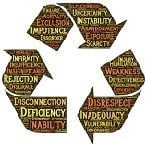Why Your Practicing Is Boring

By Chris Glyde
Hundreds of guitar players who I’ve taught have asked me the same question: “How can I make my practicing more fun and exciting?” But this is the wrong question to be asking. A better question would be: “Why is my practicing boring to begin with?” You need to know why you’re not enjoying the activity that you’re performing.
I wrote a sister article to pair with this one, and that article goes into more detail about action steps that you can take to solve some of these issues. It is entitled
“Action steps toward making your practicing more entertaining and efficient.”
 1)You carry negative beliefs about yourself when you are challenged.
1)You carry negative beliefs about yourself when you are challenged.
For many people, when they’re good at something, that task or activity is fun for them. This makes sense, because when we succeed, we generally feel pleasure and there is a rush of dopamine in the brain. Now, this doesn’t necessarily mean that a person can’t enjoy a challenge. There are many people who find challenges very exciting, and this has to do with their belief systems. Someone who enjoys a challenge doesn’t believe that a failure or lack of instant success is a bad thing. Rather, they consider it to be just another part of the learning experience. People who fear challenges tend to view the result of the challenge as a definition of who they are as a person. You can tell which type you are by how you respond to challenges.
The next time you don’t understand something right away, check in with your mind and see what it’s saying to you. I think you’ll be surprised. Beat these negative beliefs and thought processes and then you’ll be able to enjoy the challenge. Beat these negative emotions and then you’ll have so much more fun!
You have no goals.
Yes, I know, this is rattled on about all over the place, but there’s a reason that the top 10% of successful people in the
world all make goals, and what’s common about the rest of
people below is that they have no goals at all. Maybe what you’re lacking is some true goals that are also achievable. That doesn’t necessarily mean that you have to shred at 1000 bpm or
anything like that, but goals are the stepping-stones on your path to where you want to be. If you have no current goal that you’re striving for, then you really have no path. With no path, you will be going nowhere
 3)You have no way of tracking your progress.
3)You have no way of tracking your progress.
Once you select a goal and determine the skills required to get you to where you want to be as a player, you’re still going to need a way to track your progress. This could come in many different forms, and you may need to get creative. Say you want to play the guitar like Eddie Van Halen. Well, you will need to break down the proper skills required to play at the level you want. Take, for example, this list of skills:
Technique ( lead)
Technique ( chords)
Rhythm skills
Visualization
Phrasing
Ear Training
Music Theory
ECT
Tracking some of these is easier than others. Technique is easy to track, for example—you can use a metronome. However, for most of these, you will need to go a different route, and this route will make tracking your speed more efficient as well. Break down each category into smaller pieces that you will need to know.
For example, in Technique for Chords: You will need to master several types of chords to play Van Halens music: Open Chords, Power Chords, Barre Chords, etc. List these out, and then start knocking them down on your own. Make a list and then start crossing out the necessary skills once you feel like you’ve got them down. This will motivate you to keep going!
4) You don’t know why you’re practicing what you’re practicing.
This ties pretty nicely into the previous section. Most people are unsure why they’re practicing what they’re practicing. They just pick up the guitar and fumble through a couple things, and then they get distracted by a show they planned on watching, or by eating dinner at their planned time, or by making sure the laundry gets done before tomorrow, and so forth. Notice how most of the things that get done in your life have a purpose and a reason behind them. If you have no idea why you’re doing what you’re doing, you are simply not going to do it.
If you don’t know why you’re practicing what you’re practicing, and you have a teacher, consult them. Ask them how this particular task or lesson fits into the big picture. If you don’t have a teacher, you need to consult your big picture on your own, i.e. the goals and the broken-down categories that you created for yourself in the previous section. If what you’re working on doesn’t fit, get rid of it, because you don’t need it.
This particular problem could be caused by a number of issues. It could be cause by a lack of direction, meaning that you don’t understand the skills required to get to where you want to be, or it could be a lack of goals, the fact that you simply don’t have a purposeful direction in which you’re headed. It could be that you don’t have a laid out path or a clear-cut way to achieve your goals. But you can use the tools listed above to get that clear-cut path. Getting a teacher is quicker, of course, because they have already paved the path for you and you simply need to follow it. But when you teach yourself, you are basically trying to create your own path.
Conquer these problems and your practicing will no longer be boring. Instead, it will be laser focused, always changing and constantly challenging you to better yourself as a player. And be sure to check out the other article mentioned in the first paragraph for more action steps.
———-About The Author————
Chris Glyde is a dedicated and passionate Guitar Teacher In Rochester NY. If you’re interested in lessons, feel free to contact him through his website for more information.
